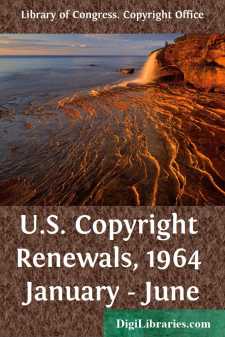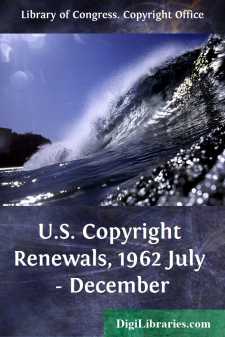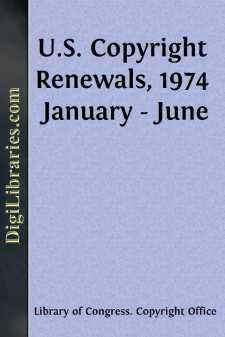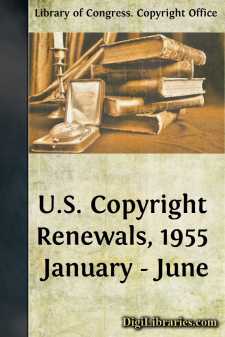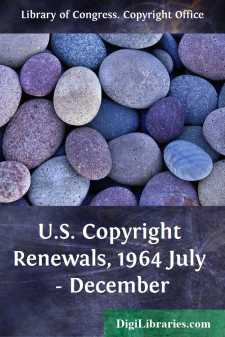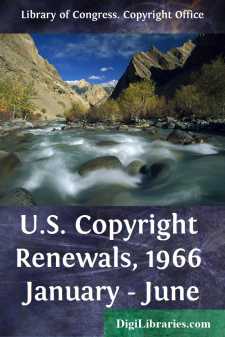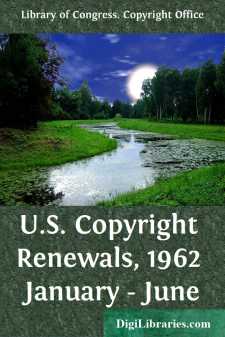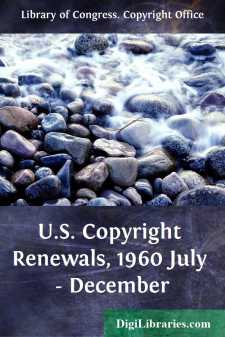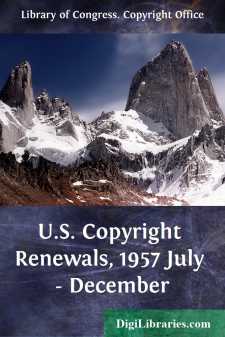Reference
- Atlases 1
- Bibliographies & Indexes 10
- Catalogs 55
- Dictionaries 1
- Encyclopedias 43
- Etiquette 14
- Handbooks & Manuals 19
- Heraldry 2
- Quotations 9
Reference Books
Sort by:
RENEWAL REGISTRATIONS A list of books, pamphlets, serials, and contributions to periodicals for which renewal registrations were made during the period covered by this issue. Arrangement is alphabetical under the name of the author or issuing body or, in the case of serials and certain other works, by title. Information relating to both the original and the renewal registration is included in each...
more...
RENEWAL REGISTRATIONS A list of books, pamphlets, serials, and contributions to periodicals for which renewal registrations were made during the period covered by this issue. Arrangement is alphabetical under the name of the author or issuing body or, in the case of serials and certain other works, by title. Information relating to both the original and the renewal registration is included in each...
more...
RENEWAL REGISTRATIONS A list of books, pamphlets, serials, and contributions to periodicals for which renewal registrations were made during the period covered by this issue. Arrangement is by registration number; as renewal registrations are numbered continuously for all classes, there will be breaks in the sequence for any given type of material. Information relating to both the original and the...
more...
RENEWAL REGISTRATIONS An alphabetical list under author, issuing body, or title of books, pamphlets, serials, and contributions to periodicals for which renewal registrations were made during the period covered by this issue. Included in the list are cross-references from the names of claimants, joint authors, editors, etc., and from variant forms of these names. Information relating to both the...
more...
RENEWAL REGISTRATIONS A list of books, pamphlets, serials, and contributions to periodicals for which renewal registrations were made during the period covered by this issue. Arrangement is alphabetical under the name of the author or issuing body or, in the case of serials and certain other works, by title. Information relating to both the original and the renewal registration is included in each...
more...
RENEWAL REGISTRATIONS A list of books, pamphlets, serials, and contributions to periodicals for which renewal registrations were made during the period covered by this issue. Arrangement is alphabetical under the name of the author or issuing body or, in the case of serials and certain other works, by title. Information relating to both the original and the renewal registration is included in each...
more...
The piano bench shown in the accompanying picture was made of black walnut and was finished natural. The finish was applied in the following manner: First, all the parts were well scraped and sandpapered, then the surface was covered with a coating of boiled linseed oil. After this had stood several hours, or until it had had time to penetrate the wood, the surplus liquid was wiped off with a flannel...
more...
RENEWAL REGISTRATIONS A list of books, pamphlets, serials, and contributions to periodicals for which renewal registrations were made during the period covered by this issue. Arrangement is alphabetical under the name of the author or issuing body or, in the case of serials and certain other works, by title. Information relating to both the original and the renewal registration is included in each...
more...
RENEWAL REGISTRATIONS A list of books, pamphlets, serials, and contributions to periodicals for which renewal registrations were made during the period covered by this issue. Arrangement is alphabetical under the name of the author or issuing body or, in the case of serials and certain other works, by title. Information relating to both the original and the renewal registration is included in each...
more...
RENEWAL REGISTRATIONS A list of books, pamphlets, serials, and contributions to periodicals for which renewal registrations were made during the period covered by this issue. Arrangement is alphabetical under the name of the author or issuing body or, in the case of serials and certain other works, by title. Information relating to both the original and the renewal registration is included in each...
more...


